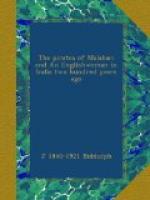During the war, the Bahamas had been twice taken and plundered by the French and Spanish; all semblance of authority had disappeared, and it was estimated that there were upwards of two thousand pirates in and about Providence. In 1718, Captain Woodes Rogers leased the islands for twenty-one years, from the proprietors, and received a commission as Governor; he sailed, for Providence, with a naval force and powers to offer an amnesty to all who submitted. Five or six well-known pirate captains made their peace with the Government, and a number of their crews, though some of them went back to their old trade before long. England, La Buze, and others slipped away and made for Madagascar. A council was then formed, consisting of six of the adventurers and six of the inhabitants who had never been pirates themselves. This was followed by the submission of others; some were hung, and order of a sort was re-established in the Bahamas.
The coasts of Virginia and North Carolina were at this time beset by a number of pirates, the most notorious of whom was Edward Teach, alias Blackbeard, a Bristol man, who had begun his piratical career in the spring of 1717; the most sinister figure in the annals of piracy. Pirate captains were, as a rule, chosen by their crews, and if their conduct was unsatisfactory to the rovers, they were deposed and sometimes put to death or marooned; but Teach, as fearless as he was merciless, ruled his crew by terror. As an instance of his savage humour, it is related that on one occasion, in a drinking bout, he blew out the light and fired two pistols among his companions, wounding Israel Hands, his sailing master, severely. On being asked why he did it, he damned them, and said if he did not kill one of them now and then, they would forget who he was. So impressed were his crew with his wickedness, that they believed they carried the devil on board, who appeared at intervals among them as one of the crew, but could not be identified as belonging to the ship’s company. Once he fought the Scarborough, a man-of-war of thirty guns, and beat her off. He boldly went ashore when he pleased, forcing the Governor of North Carolina to marry him, and to supply him with medicines for his crew. With his face covered with black hair, and a beard of extravagant length, fantastically tied up in ribbons, he presented a wild and truculent figure that was the terror of the coast.
An extract of a journal he kept, found after his death, is given by Johnson—
“Such a day, Rum all out:—Our company somewhat sober: A damn’d confusion amongst us!—Rogues a plotting;—great talk of separation.—So I look’d sharp for a Prize;—such a day took one, with a great deal of Liquor on board, so kept the Company hot, damned hot, then all things went well again.”
Eden, the Governor of North Carolina, was suspected of sharing in Teach’s plunder, and his conduct was so suspicious that it could only be set down to




